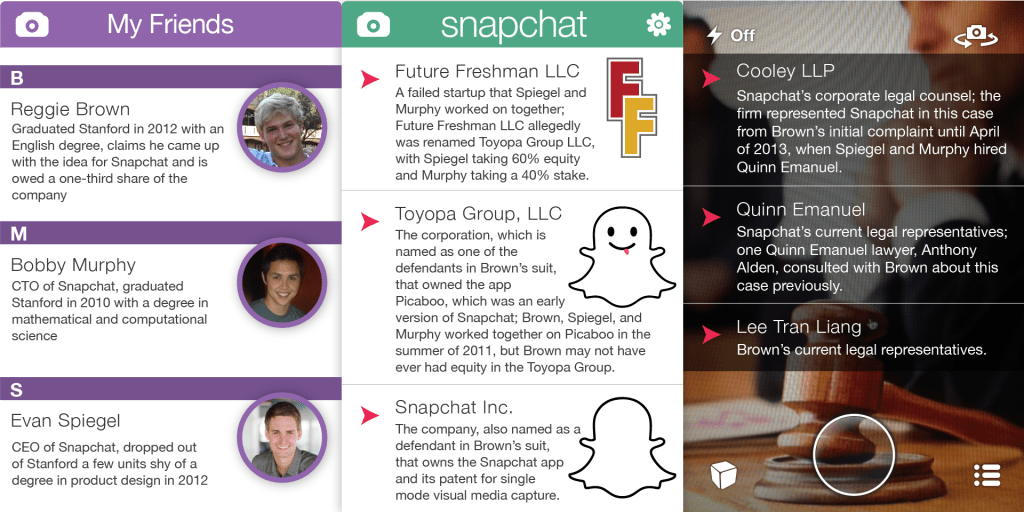A judge denied alleged Snapchat co-founder Reggie Brown's motion to disqualify Quinn Emanuel from representing Snapchat today. Quinn Emanuel will continue to represent the company as the case moves forward.
Brown filed a suit in February claiming that he came up with the idea for a disappearing messages app that eventually became Snapchat. Brown says he was wrongfully kicked out of the company by co-founders Evan Spiegel and Bobby Murphy, and is seeking a full, undiluted one-third stake in the company–currently valued at $267 million. While admitting that Brown came up with the idea, Spiegel and Murphy contend that he never had equity in the venture.
Brown's representatives, Lee Tran & Liang (LTL), filed a motion in June to disqualify Quinn Emanuel from representing Snapchat. Brown had previously consulted with and sent files to Quinn Emanuel attorney Anthony Alden. LTL argued that because of this, Quinn Emanuel could not switch sides and represent Snapchat.
However, Brown signed a waiver stating that Quinn Emanuel was not representing him and Quinn Emanuel could represent other parties down the line if it so chose. Quinn Emanuel claims they set up an ethical wall, sealing Alden off from the rest of the firm, and that because of the waiver and ethical wall, the firm should not be disqualified.
"We're pleased that the Court enforced Mr. Brown's clear and unequivocal promise not to seek to disqualify the firm," Quinn Emanuel partner Bruce Van Dalsem said.
While this ruling will likely not have a major impact on who wins the overall case, it saves Snapchat co-founders Evan Spiegel and Bobby Murphy a good amount of time and energy, as they do not have to go find new representatives.
The waiver and the ethical wall were the major points the two sides argued over in oral arguments in front of Judge Joseph R. Kalin this past Thursday.
"Most of the documents are arguing the merits of the case and not necessarily the disqualification of counsel," Kalin noted. Both sides have submitted ample documentation from the discovery phase in motions that should be solely related to the issue of the potential disqualification of Quinn Emanuel.
The lawyers argued over a number of details, particularly precedents for the waiver, and both sides accused the other's client of trying to gain an unfair tactical advantage. LTL argued that Snapchat hired Quinn Emanuel because Spiegel and Murphy heard in depositions that Brown had consulted with a Quinn Emanuel attorney. Quinn Emanuel fired back that Brown was pressing to disqualify Quinn Emanuel merely as a tactical move to disrupt Snapchat because he had signed Quinn Emanuel's waiver before speaking to Alden.
"The advantage waiver was satisfactory and effective under the circumstances," Kalin wrote in his ruling. "Furthermore, the court is satisfied that Alden has not had and will not have any improper communication with others at the firm concerning the litigation due to the timely and adequate ethical wall constructed by Quinn Emanuel."
In fitting story lines for this case, Quinn Emanuel represented the Winkelvoss twins in their famous suit against Facebook, and the Lee Tran & Liang firm was founded by former Quinn Emanuel attorneys.
"We disagree with but respect the Court's decision," LTL attorney James Lee tells me. "We will evaluate our options but regardless of what we decide to do, we look forward to litigating this case on the merits to get Mr. Brown his rightful 1/3 in Snapchat."
A trial date has not yet been set but I'm told we can expect it to be sometime in the March or April of 2014. Brown, Spiegel, and Murphy were not present at the hearing, which was expected.
The two sides will have months to discover new evidence and prepare their arguments before arguing them in court, but we know the core of the case. The majority of the case will focus on a few key moments in a five month period in the spring and summer of 2011.
Brown's representatives will likely argue that he came up with the idea and was joined by Spiegel and Murphy. The trio then moved to Los Angeles together and entered into a joint venture, using Spiegel and Murphy's old LLC, Future Freshman, for convenience and cost purposes, but never with Brown sacrificing all claims to equity. They will say that Spiegel and Murphy wrongfully outed Brown from the company
Snapchat's representatives will claim that while Brown came up with the initial idea, which was not a particularly novel idea, it was Spiegel and Murphy who made the application what it is today. Furthermore, they will likely argue that when Spiegel and Murphy converted their old venture, Future Freshman LLC, to the Toyopa Group (an entity which they eventually converted to Snapchat Inc.), Brown had no equity in the group; Brown's equity claims are tied to a patent that was never approved, and thus his claim is to one third of nothing.
Disclosure: I am heading into my senior year at Stanford and the president of the Stanford chapter of Kappa Sigma. Brown, Spiegel, and Murphy were all members of Kappa Sigma at some point during their time at Stanford. By the time I joined the fraternity, in the spring of 2011 (my freshman year), Murphy had graduated from Stanford, and Spiegel and Brown had left the fraternity.
I have never met Brown. I've met Murphy once. I have gotten to know Spiegel since the spring of 2012, mostly through interviews for TechCrunch. This in no way affects my objectivity or ability to report on this lawsuit or the company.

No hay comentarios:
Publicar un comentario